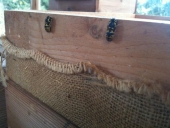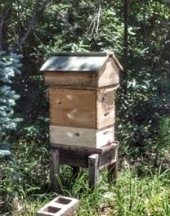
 6
6




 5
5




Om is where the heart is.
 4
4




 7
7




'What we do now echoes in eternity.' Marcus Aurelius
How Permies Works Dr. Redhawk's Epic Soil Series
 6
6




Argue for your limitations and they are yours forever.
 10
10




Kaarina Kreus wrote:I've been told to check eggs, drones and possible queen cells, pollen, honey weekly
find religion! church
kiva! hyvä! iloinen! pikkumaatila
get stung! beehives
be hospitable! host-a-hive
be antisocial! facespace
 6
6




 3
3




Pete Podurgiel wrote:HI Kaarina:
As far a checking the hive, it's best not to open the hive more than every other week or so, unless you have good cause to do so (ie: if you are feeding them). If they are being disturbed too much, there's a chance they will abscond in search of a more secure home. In between inspections, observe what the workers/foragers are doing. If they are bringing in pollen, that's a pretty good sign that your queen is laying and all is good.
 2
2




Kaarina Kreus wrote:
Thank you. I see them flying back and forth, the entrance looks like a busy airport ❤
Why do they have these evening gatherings?
Om is where the heart is.
 2
2




Argue for your limitations and they are yours forever.
 1
1




 2
2




 5
5




Moderator, Treatment Free Beekeepers group on Facebook.
https://www.facebook.com/groups/treatmentfreebeekeepers/









tel jetson wrote:
well... that's one way to do things. get used to irritable bees if that's the route you choose. the hive atmosphere plays a large role in honey bees' communication as well as their immune and reproductive systems. without a lot of precautions, opening a typical frame hive dramatically disturbs that .
 2
2




Kaarina Kreus wrote:
tel jetson wrote:
well... that's one way to do things. get used to irritable bees if that's the route you choose. the hive atmosphere plays a large role in honey bees' communication as well as their immune and reproductive systems. without a lot of precautions, opening a typical frame hive dramatically disturbs that .
Thank you.
 1
1




Pete Podurgiel wrote:
I'm curious as to the 'staggered' boxes - do you have a bottom board with an entrance or did you just happen to do an inspection?

| I agree. Here's the link: http://stoves2.com |


